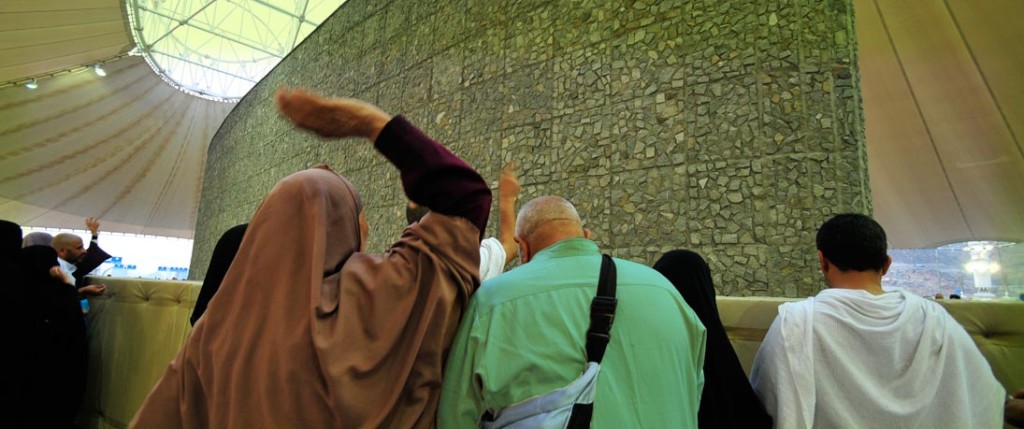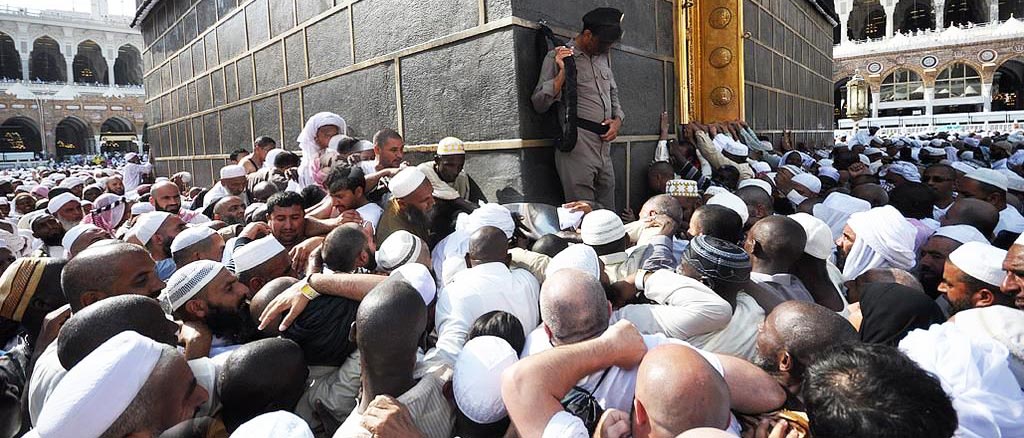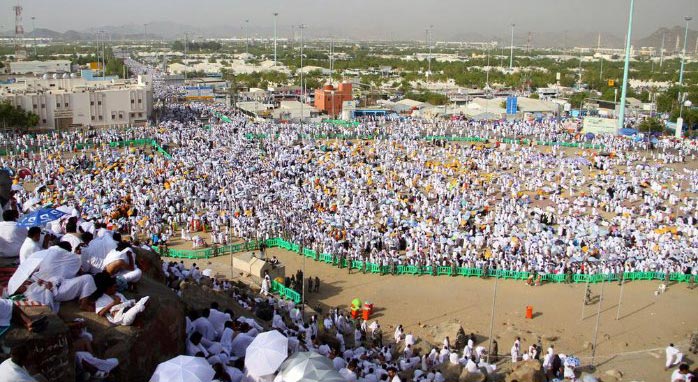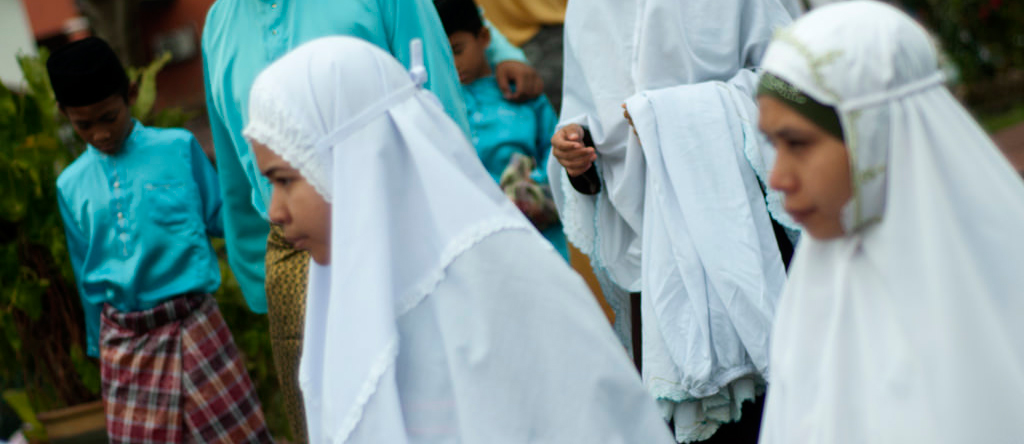In the saheeh Sunnah are narrated du’aa’s and adhkaar which you can recite during the rituals of Umrah, and from which the Muslim can benefit by memorizing them, understanding them and acting upon them. These include the following :
A – At the Meeqaat when entering into a state of Ihram:
It is Sunnah for the Muslim to recite tasbeeh (saying “Subhaan-Allaah (glory be to Allah)”), tahleel ( saying “Laa ilaaha ill-Allah (there is no god but Allah)” ) and takbeer ( saying “Allahu akbar (Allah is Most Great)” ) before entering ihram for Umrah.
It was narrated that Anas (may Allah be pleased with him) said: The Messenger of Allah (peace and blessings of Allah be upon him) prayed Zuhr with four rak’ahs when we were with him in Medina, and he prayed ‘Asr in Dhu’l-Hulayfah with two rak’ahs, then he stayed there overnight. When morning came he rode until he reached al-Bayda’, then he praised, glorified and magnified Allah. Then he recited Talbiyah with the intention of performing Hajj and ‘Umrah and the people did likewise. (Narrated by al-Bukhaari, 1476.)
Al-Haafiz ibn Hajar said:
This ruling – that it is (preferable) mustahabb to recite tasbeeh and the other (adhkaars) mentioned before ihram – is something that not many people do even though it is proven in the Sunnah.
Fath al-Baari, 3/412 .
B – On the way to Mecca, between the Meeqaat and arrival in Mecca:
It is Sunnah to recite the Talbiyah a great deal and to raise one’s voice – for men; women should recite in a low voice so that no non-mahram men will hear them.
It was narrated from ‘Abd-Allaah ibn ‘Umar (may Allaah be pleased with him) that when the Messenger of Allaah (peace and blessings of Allaah be upon him) set out riding from the mosque of Dhu’l-Hulayfah, he recited the Talbiyah and said: “ Labbayk Allaahumma labbayk, labbayka laa shareeka laka labbayk, inna al-hamda wa’l-ni’matah laka wa’l-mulk, laa shareeka lak (Here I am, O Allaah, here I am. Here I am, You have no partner, here I am. Verily all praise and grace and dominion are Yours, You have no partner).”
Narrated by al-Bukhaari, 5571; Muslim, 1184.
C – During Tawaf
Every time you come in line with the Black Stone in each circuit, say, “Allaahu Akbar.” Al-Bukhari (1613) narrated from Ibn ‘Abbaas ( may Allah be pleased with him) that the Prophet ( peace and blessings of Allah be upon him) circumambulated the House, and every time he came to the corner ( i.e., the Black Stone), he pointed to it with something he had in his hand and said takbeer.
Between the Yemeni Corner and the Black Stone you should say the words that were narrated from ‘Abd-Allaah ibn al-Saa’ib, who said: I heard the Messenger of Allaah ( peace and blessings of Allaah be upon him) say between the two Corners: “ Rabbana aatina fi’l-dunya hasanah wa fi’l-aakhirah hasanah wa qina ‘adhaab al-naar ( Our Lord, give us that which is good in this world and that which is good in the Hereafter, and protect us from the torment of the Fire).” Narrated by Abu Dawood, 1892; classed as hasan by Shaykh al-Albaani in Saheeh Abi Dawood.
D- Before climbing up al-Safa and when atop it:
It was narrated that Jaabir ibn ‘Abd-Allah said: … then he ( the Prophet (peace and blessings of Allah be upon him)) went out through the gate to al-Safa and when he drew near to al-Safa he recited: “ Verily, As-Safa and Al-Marwah (two mountains in Makkah) are of the Symbols of Allaah” [al-Baqarah 2:158 – interpretation of the meaning], (and he said:) “ I begin with that with which Allaah began.” He began with al-Safa and climbed it until he could see the House, then he turned to face the qiblah and proclaimed the Oneness of Allaah and magnified Him, and said: “ Laa ilaaha ill-Allaah wahdahu laa shareeka lah, lahu’l-mulk wa lahu’l-hamd wa huwa ‘ala kulli shay’in qadeer; Laa ilaaha ill-Allaah wahdahu anjaza wa’dah wa nasara ‘abdah wa hazama al-ahzaaba wahdah (There is no god but Allaah alone, with no partner or associate, His is the dominion and to Him be praise, and He is able to do all things; there is no god but Allaah alone, He fulfilled His promises and granted victory to His slave and defeated the confederates alone).” Then he made du’aa’ between that and repeated this three times.
Narrated by Muslim, 1218.
E – When climbing al-Marwah
You should do the same as you did when climbing al-Safa, without reciting the verse before starting to climb.
Jaabir ( may Allah be pleased with him) said: Then he came down towards al-Marwah and when his feet reached the bottom of the valley he ran until the ground started to rise, then he walked until he came to al-Marwah, and he did at al-Marwah as he had done at al-Safa. Narrated by Muslim, 1218.
When drinking Zamzam water, you may say du’aa’ asking for the best of this world and the Hereafter, because the Prophet (peace and blessings of Allaah be upon him) said: “ The water of Zamzam is for whatever it is drunk for.” Narrated by Ibn Maajah, 3062; classed as saheeh by al-Albaani in 5502.
Similarly it is prescribed to remember Allaah a great deal (dhikr), which includes du’aa’, during tawaaf and saa’i, so the Muslim should make du’aa’ as Allaah inspires him. There is nothing wrong with reciting Qur’aan during tawaaf and saa’i. What some people say, that there are special du’aa’s for each circuit of tawaaf and saa’i is something for which there is no basis in sharee’ah.
Shaykh al-Islam Ibn Taymiyah said:
It is (preferable) mustahabb during tawaf to remember Allah and call upon Him in ways that are prescribed in sharee’ah. If one recites Qur’aan there is nothing wrong with that. There is no specific dhikr that has been narrated from the Prophet (peace and blessings of Allah be upon him), that he either enjoined, said or taught to others. Rather ( the pilgrim) may say any du’aa’ that is prescribed in sharee’ah. What many people say, that there is a specific du’aa’ to be recited beneath the downspout of the Ka’bah and so on has no basis.
The Prophet (peace and blessings of Allah be upon him) used to end his tawaf between the two Corners by saying, “ Rabbana aatina fi’l-dunya hasanah wa fi’l-aakhirah hasanah wa qina ‘adhaab al-naar (Our Lord, give us that which is good in this world and that which is good in the Hereafter, and protect us from the torment of the Fire),” as he used to finish all his du’aa’s with these words, and there is no specific du’aa’ for that, according to scholarly consensus.
Majmoo’ al-Fataawa, 26/122, 123
Umrah Packages | Hajj Packages | Ramadan Umrah Packages | December Umrah Packages
Source: go-makkah.com



